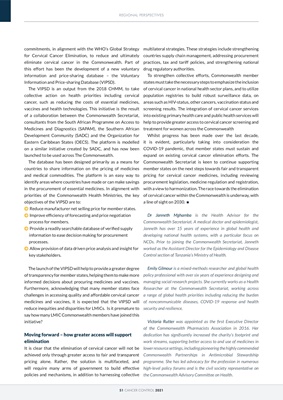
REGIONAL PERSPECTIVES
51 CANCER CONTROL 2021
multilateral strategies. These strategies include strengthening
countries supply chain management, addressing procurement
practices, tax and tariff policies, and strengthening national
drug regulatory authorities.
To strengthen collective efforts, Commonwealth member
states must take the necessary steps to emphasize the inclusion
of cervical cancer in national health sector plans, and to utilize
population registries to build robust surveillance data, on
areas such as HIV-status, other cancers, vaccination status and
screening results. The integration of cervical cancer services
into existing primary health care and public health services will
help to provide greater access to cervical cancer screening and
treatment for women across the Commonwealth
Whilst progress has been made over the last decade,
it is evident, particularly taking into consideration the
COVID-19 pandemic, that member states must sustain and
expand on existing cervical cancer elimination efforts. The
Commonwealth Secretariat is keen to continue supporting
member states on the next steps towards fair and transparent
pricing for cervical cancer medicines, including reviewing
procurement legislation, medicine regulation and registration,
with a view to harmonization. The race towards the elimination
of cervical cancer within the Commonwealth is underway, with
a line of sight on 2030. n
Dr Janneth Mghamba is the Health Advisor for the
Commonwealth Secretariat. A medical doctor and epidemiologist,
Janneth has over 15 years of experience in global health and
developing national health systems, with a particular focus on
NCDs. Prior to joining the Commonwealth Secretariat, Janneth
worked as the Assistant Director for the Epidemiology and Disease
Control section of Tanzania's Ministry of Health.
Emily Gilmour is a mixed-methods researcher and global health
policy professional with over six years of experience designing and
managing social research projects. She currently works as a Health
Researcher at the Commonwealth Secretariat, working across
a range of global health priorities including reducing the burden
of noncommunicable diseases, COVID-19 response and health
security and resilience.
Victoria Rutter was appointed as the first Executive Director
of the Commonwealth Pharmacists Association in 2016. Her
dedication has significantly increased the charity's footprint and
work streams, supporting better access to and use of medicines in
lower resource settings, including pioneering the highly commended
Commonwealth Partnerships in Antimicrobial Stewardship
programme. She has led advocacy for the profession in numerous
high-level policy forums and is the civil society representative on
the Commonwealth Advisory Committee on Health.
commitments, in alignment with the WHO's Global Strategy
for Cervical Cancer Elimination, to reduce and ultimately
eliminate cervical cancer in the Commonwealth. Part of
this effort has been the development of a new voluntary
information and price-sharing database - the Voluntary
Information and Price-sharing Database (VIPSD).
The VIPSD is an output from the 2018 CHMM, to take
collective action on health priorities including cervical
cancer, such as reducing the costs of essential medicines,
vaccines and health technologies. This initiative is the result
of a collaboration between the Commonwealth Secretariat,
consultants from the South African Programme on Access to
Medicines and Diagnostics (SAPAM), the Southern African
Development Community (SADC) and the Organization for
Eastern Caribbean States (OECS). The platform is modelled
on a similar initiative created by SADC, and has now been
launched to be used across The Commonwealth.
The database has been designed primarily as a means for
countries to share information on the pricing of medicines
and medical commodities. The platform is an easy way to
identify areas where countries have made or can make savings
in the procurement of essential medicines. In alignment with
priorities of the Commonwealth Health Ministries, the key
objectives of the VIPSD are to:
J Reduce manufacturer net selling price for member states.
J Improve efficiency of forecasting and price negotiation
process for members.
J Provide a readily searchable database of verified supply
information to ease decision making for procurement
processes.
J Allow provision of data driven price analysis and insight for
key stakeholders.
The launch of the VIPSD will help to provide a greater degree
of transparency for member states, helping them to make more
informed decisions about procuring medicines and vaccines.
Furthermore, acknowledging that many member states face
challenges in accessing quality and affordable cervical cancer
medicines and vaccines, it is expected that the VIPSD will
reduce inequities and disparities for LMICs. Is it premature to
say how many LMIC Commonwealth members have joined this
initiative?
Moving forward - how greater access will support
elimination
It is clear that the elimination of cervical cancer will not be
achieved only through greater access to fair and transparent
pricing alone. Rather, the solution is multifaceted, and
will require many arms of government to build effective
policies and mechanisms, in addition to harnessing collective